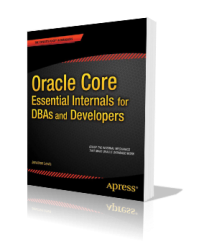There are many little bits and pieces lurking in the Oracle code that would have been very useful if only you had had time to notice them when they frist appeared. Here’s one that seems to be virtually unknown but does an excellent job of eliminating calls to decode().
The nvl2() function takes three parameters, returning the second if the first is not null and returning the third if the first is null. This is convenient for all sorts of examples where you might otherwise use an expression involving case or decode(), but most particularly it’s a nice little option if you want to create a function-based index that indexes only those rows where a column is null.
Here’s a code fragment to demonstrate the effect:
rem rem Script: nvl2.sql rem Author: J.P Lewis rem Dated: Sep 2012 rem select nvl2(1,2,3) from dual; select nvl2(null,2,3) from dual; select nvl2(1,null,3) from dual; select nvl2(null,null,3) from dual;
And here’s the resulting output – conveniently the function call is also the column heading in the output:
NVL2(1,2,3)
-----------
2
NVL2(NULL,2,3)
--------------
3
NVL2(1,NULL,3)
--------------
NVL2(NULL,NULL,3)
-----------------
3
Note, particularly, from the thrid example that a non-null input (first parameter) turns into the null second parameter, and (fourth example) the null input turns into the non-null third parameter. To create a function-based index on rows where “columnX” is null and be able to access those rows by index you need only do the following:
create index t1_f1 on t1(nvl2(columnX,null,0)); select * from t1 where nvl2(columnX,null,0) = 0;
Don’t forget that you will need to gather stats on the hidden column supporting the function-based index before you can expect the optimizer to use it in the correct cases.
Update (August 2015)
You can get a slightly unexpected optimisation (generally small, but it could be significant if it allows a query to become index-only) from using nvl2() rather than nvl() for a predicate of the form (:bind is null or column = :bind) – see this thread on the Oracle database forum for details. The nvl2() function can be used as a workaround for a suprising limitation in the optimizer’s ability to apply a particular filter predicate in the index. Bear in mind, though, that the limitation is an example of the type of defect that tends to disappear after a couple of upgrades.

The nvl2 function is really more appropriate for such fbi in fact, since it is faster than the “decode (x, null, 1)” and, although a little slower than the “case when x is null then 1 end”, but more readable and shorter.
with gen as ( select n from (select level from dual connect by level<=1e6) ,(select 1 n from dual union all select null from dual ) t ) select sum(nvl2(n,null,1)) --1.046 secs --sum(decode(n,null,1)) -- 1.482 secs --sum(case when n is null then 1 end) --0.982 seconds from gen /But it also has disadvantages. For example, in contrast to “decode” it evaluates all its arguments.
Comment by Sayan Malakshinov — April 23, 2012 @ 7:39 pm BST Apr 23,2012 |
I fell in love with NVL2 for about a week – and then realised that it wasn’t a supported construct under the WRAP tool, so it was back to decodes. Sigh.
Comment by Kieran Walsh — April 23, 2012 @ 8:57 pm BST Apr 23,2012 |
@Kieran,
I never seem to have any problems with nvl2 apart from the fact that nvl2 is not supported in a pl/sql context for some reason.
3:1051:45945:11234>select * from v$version;
BANNER
--------------------------------------------------------------------------------
Oracle Database 11g Enterprise Edition Release 11.1.0.7.0 - 64bit Production
PL/SQL Release 11.1.0.7.0 - Production
CORE 11.1.0.7.0 Production
TNS for Linux: Version 11.1.0.7.0 - Production
NLSRTL Version 11.1.0.7.0 - Production
3:1051:45945:11234>@ c:\work\sql_scripts\t.sql
Function created.
3:1051:45945:11234>select text from user_Source where name = 'TEST_FUNC';
TEXT
----------------------------------------------------------------------------------------------------
function test_func(pi_input Varchar2)
return varchar2
is
l_Status Varchar2(10);
Begin
select nvl2(pi_input, 'Not Null', 'Null') into l_status
from dual;
return l_Status;
end;
9 rows selected.
3:1051:45945:11234>select test_func(null) from dual;
TEST_FUNC(NULL)
----------------------------------------------------------------------------------------------------
Null
C:\work\sql_scripts>wrap iname=t.sql oname=t.plb
PL/SQL Wrapper: Release 10.2.0.1.0- Production on Tue Apr 24 11:18:34 2012
Copyright (c) 1993, 2004, Oracle. All rights reserved.
Processing t.sql to t.plb
3:1051:45945:11234>@ c:\work\sql_scripts\t.plb
Function created.
3:1051:45945:11234>select text from user_Source where name = 'TEST_FUNC';
TEXT
----------------------------------------------------------------------------------------------------
function test_func wrapped
snipped
3:1051:45945:11234>select test_func(null) from dual;
TEST_FUNC(NULL)
----------------------------------------------------------------------------------------------------
Null
3:1051:45945:11234>select test_func('hello') from dual;
TEST_FUNC('HELLO')
----------------------------------------------------------------------------------------------------
Not Null
3:1051:45945:11234>
Thanks
Comment by Raj — April 24, 2012 @ 10:25 am BST Apr 24,2012 |
Also more useful if they work. See MOS Bug 5490501 – Wrong Results with COALESCE or NVL2 on aggregations inside subqueries [ID 5490501.8]
The wrap issue is explained in How to Find out the Reason for PLS-00201 in PL/SQL [ID 269973.1]: “Some recent SQL syntax is not supported by the wrap utility by default. To enable the support for all SQL syntax, specify the option edebug=wrap_new_sql (with no dash). “
Comment by jgarry — April 24, 2012 @ 8:58 pm BST Apr 24,2012 |
Thanks for the responses everyone.
This is one reason why I like the blogging environment to the old Web Page approach. It allows other people to add value to the original article and reveal extra benefits (or problems, or version-dependencies) that you wouldn’t necessarily find out for yourself until it’s too late.
Comment by Jonathan Lewis — April 30, 2012 @ 2:32 pm BST Apr 30,2012 |
[…] highlighted several lines in the select list which show the nvl2() function with a scalar subquery against the obj$ table as its second parameter. These are the five […]
Pingback by dbms_xplan bug | Oracle Scratchpad — August 13, 2023 @ 10:36 pm BST Aug 13,2023 |